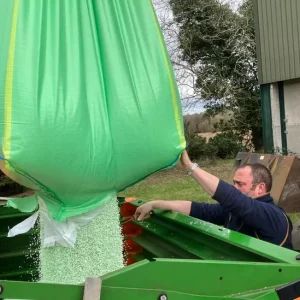
An importer of fertiliser said he expected food prices to drop as the product’s cost had fallen to levels not seen since the Ukraine invasion began.
Due to the war, 70% of European ammonia capacity was reduced or shut down.
Prices of some fertiliser hit more than £1,000 a tonne last year, but have since lowered to about £450 a tonne.
John Fuller, chairman of Brineflow in Great Yarmouth, Norfolk, said his business had “been on a rollercoaster ride”.
The importer was speaking as the first of three ships carrying a total of 12,000 tonnes of liquid fertiliser from Trinidad docked at the port.
With the Russian market also closed, his industry has had to look to parts of the world like the United States, the Caribbean, Malaysia and Indonesia in order to import the product.
These markets had until recently been considered uneconomic to source fertiliser from.
Mr Fuller, who is also the Conservative leader of South Norfolk Council, said: “We’ve had to have much larger vessels, we’ve had to invest in new berths at Sunderland and Great Yarmouth, but the industry has found a solution.
“The cost of fertiliser is on the way down and that means cheaper food for everybody.”
Wheat farmer Jamie Burrows, based near Old Buckenham in Norfolk, said it was “a relief” that fertiliser prices were coming down.
He said: “You see a lorry of fertiliser arriving in the yard and you start to do the numbers on what it’s costing and it’s been quite scary.
“I’m spending £200 a tonne less on fertiliser than I was last year, so that’s a big improvement.”
However, because farmers have already bought their fertiliser for this year’s early crops, he said it would be a while before shoppers notice prices dropping.
Fertiliser is made by using large amounts of energy and the price was already going up before the war in Ukraine, because of the increased demand for gas.
The Agricultural Industries Confederation, based in Peterborough, represents companies who supply to farmers.
Jo Gilbertson, the group’s head of fertilisers, said: “Gas is still three times more expensive than it was before [the Ukrainian war], so although it’s a welcome move that fertiliser prices are coming down, they are still high compared with 2021.
“I think the era of cheap energy is past us now and I don’t think we’ll be back at the prices we’ve seen in the past for a very long time, if at all.”
Source – BBC News


